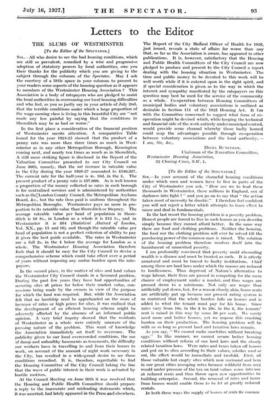Letters to the Editor
THE SLUMS OF WESTMINSTER [To the Editor of the SPECTATOR.] Silt,—All who desire to see the bad housing conditions, which arc still so prevalent, remedied by a wise and progressive adoption of statutory powers by local authorities, owe you their thanks for the publicity which you are giving to the subject through the columns of the Spectator. May I ask the courtesy of a little space in your columns to present to your readers some aspects of the housing question as it appears to members of the Westminster Housing Association ? This Association is a body of ratepayers who are pledged to assist the local authorities in overcoming our local housing difficulties and who feel, as you so justly say in your article of July 2nd, that the terrible conditions under which a large proportion of the wage-earning class is living in this beautiful City are "not made any less painful by saying that the conditions in Shoreditch may be as bad or worse."
In the first place a consideration of the financial position of Westminster merits attention. A comparative Table issued for the year 1924-25 showed that the product of a penny rate was more than three times as much in West- minster as in any other Metropolitan Borough, Kensington coming next, and nearly ten times as much as in Shoreditch.
A still more striking figure is disclosed in the Report of the Valuation Committee presented to our City Council on
June 30th, namely, that the net increase in rateable value in the City during the year 1926-27 amounted to £340,337. The current rate for the half-year is 4s. 10d. in the X. The
present product of a penny rate is £37,000. As is well known a' proportion of the money collected as rates in each borough is for centralized services and is administered by authorities such as the:London. County Council, the Metropolitan Asylums
Board, &c., but the rate thus paid is uniform throughout the Metropolitan Boroughs. Westminster pays no more in pro-
portion to its rateable value than Shoreditch or Stepney. The average rateable value per head of population in Shore- ditch is £8 8s., in London as a whole it is £12 ls.. and in
Westminster it is £64 (Statistical Abstract of Landon,
Vol. XX., pp. 15 and 16), and though the rateable value per head of population is not a perfect criterion of ability to pay it gives the best guide available. The rates in Westminster are a full 2s. in the £ below the average for London as a whole. The Westminster Housing Association therefore feels that it should be easy for the City Council to devise a comprehensive scheme which could take effect over a period of years without imposing any undue burden upon the rate- payers.
In the second place, in the matter of sites and land values the Westminster City Council stands in a favoured position. During the past few years they have had opportunities of securing sites at prices far below their market value, con- cessions being made by the owners in view of the purpose for which the land was required. But, while the Association felt that no hardship need be apprehended on the score of increase of rates or high prices for sites, it was realized that the development of an efficient housing scheme might be adversely affected by the absence of an informed public opinion. A very brief inquiry showed that the residents of Westminster as a whole were entirely unaware of the pressing nature of the problem. This want of knowledge the Association immediately set itself to overcome. The publicity given to our local overcrowded conditions, the use of damp and unhealthy basements as tenements, the difficulty our workers have in travelling to and from their homes to work, on account of the amount of night work necessary in the City, has resulted in a widespread desire to see these conditions remedied. It is, therefore, regrettable to find the Housing Committee of the City Council taking the line that the wave of public interest in their work is actuated by hostile motives.
At the Council Meeting on June 30th it was resolved that the Housing and Public Health Committee should prepare a reply to the inaccurate and misleading statements which, it was asserted, had lately appeared in the Press and elsewhere. The Report of the City Medical Officer of Health for 1926, just issued, reveals a state of affairs far worse than any that, so far as the Association is aware, has appeared in other publications. It is, however, satisfactory that the Housing and Public Health Committees of the City Council are now pledged to produce and present to the City Council a report dealing with the housing situation in Westminster. The time and public money to be devoted to this work will be well worth while if it is entered upon in the right spirit, and if special consideration is given as to the way in which the interest and sympathy manifested by the ratepayers on this question may best be used for the service of the community as a whole. Co-operation between Housing Committees of municipal bodies and voluntary associations is outlined as desirable in Section 111 of the 1925 Housing Act. It lies with the Committee concerned to suggest what form of co- operation might be devised which, while keeping the technical and financial side of the work entirely under municipal control, would provide some channel whereby those badly housed could reap the advantages possible through co-operation between voluntary associations and the local authority.— I am, Sir, &c.,
HILDA RI:NCI:RAN,
Chairman of the Executive Committee. Westminster Housing Association,
32 Charing Cross, S.W. 1.










































 Previous page
Previous page